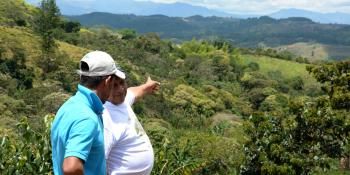Climate-smart women farmers break gender barriers in Kenya

Climate-smart farmers Josephine Mutua and Queen Teva in Eastern Kenya are taking the lead on their farms and in the community, breaking gender barriers and changing perceptions of women along the way.
Originally published on AlertNet Blog
“Before I didn’t say anything, during meetings,” says farmer Josephine Mutua, a soft-spoken but assured woman from Eastern Kenya. “Now that I have knowledge about different agricultural techniques I have the confidence to speak up and share the information in church or when I have visitors,” she explains.
Josephine credits this change to her role in managing a climate-smart learning site as part of the CGIAR Research Program on Climate Change, Agriculture and Food Security (CCAFS) climate-smart village activities in Makueni, Kenya. Together with her neighbour Queen Teva, the duo is taking the lead to show how women can make their farms climate-smart. As they gain new skills and knowledge, there is no limit to what they can achieve.
Queen Teva and Josephine Mutua have been actively participating in the village activities for the last two years. With support from local partners they lead two learning sites trialling a number of climate-smart techniques and drought-resistant seeds to learn what works best for their area, and which practices are not a suitable match. Getting it right is important; as climate-smart farm practices have the ability to support smallholders adapt to, and mitigate, climate change while improving yields and income.

In the photo: Queen Teva to the left and Josephine Mutua, two climate-smart farming champions in Eastern Kenya. Photo: C. Schubert (CCAFS)
Both women agree that getting involved in the climate-smart village activities has impacted their lives, both in terms of increased yields, but also in how they are viewed by their fellow community members and friends:
“I feel like the community members respect me more, as I now train others, I am involved in community meetings and talk to visitors who want to see my plot,” says Josephine. “I feel proud as I am able to teach others about agriculture technologies”
On the food production side, Queen explains; “I used to get 2 bags of Sorghum but now I get 4-5 bags from the same acre from planting drought-resistant seeds.”
“I feel a sense of relief, as I now know a number of agriculture techniques that I can use on my farm. I know my family will be food secure and I don’t have to worry like before,” she continues.
Women less aware
The ladies were chosen to champion these practices because of their keen interest to keep farming in an increasingly warm and dry climate. Their husbands, who normally work outside the household, support their wives in leading the way on the farm and in the community and are happy with the changes they’ve seen.
However in most households they would typically be the ones taking the lead on climate-smart farming as recent research shows that women in Africa are less likely than men to be aware of the practices. This is because channels of disseminating agricultural information do not favor women.
Getting the information out to women farmers and socially marginalized groups is therefore key, as the same research shows that women who know about the practices are just as likely as men - if not more - to adopt them. Josephine and Queen’s achievements exemplify these findings.
Read the rest of the story on AlertNet.
A seminar on Closing the Gender Gap for farming under climate change will put the spotlight on more efforts from around the world, presenting evidence to inspire renewed action. Pre-register now for the live webcast on 19 March and join the conversation!
Story produced by Cecilia Schubert, Communication Officer for CCAFS Flagship on "Policies and Institutions on Climate-Resilient Food Systems", in collaboration with Vivian Atakos, CCAFS East Africa Communication Officer.



